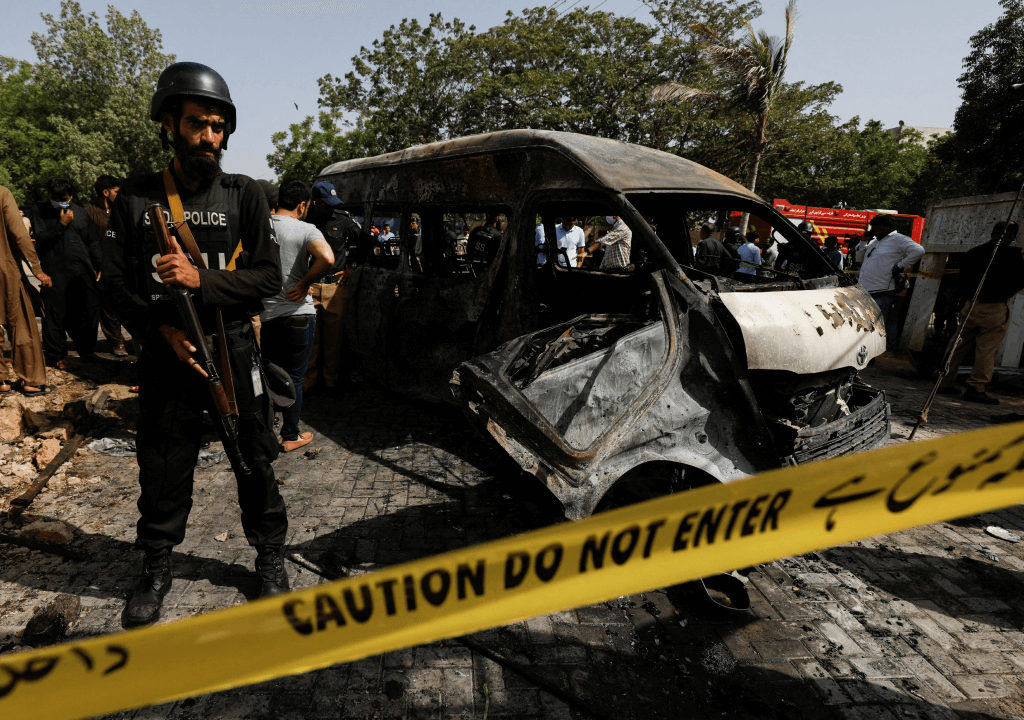Pakistan faces a series of ongoing challenges, encompassing political instability, a dearth of employment opportunities, sluggish economic progress, insufficient infrastructural development, and a variety of other pressing concerns. Yet, among these, the paramount issue demanding immediate action is terrorism. Formerly perceived as assets in regional conflicts with Afghanistan and India, terrorists have now transformed into a substantial liability. The nation’s aspirations for tranquility are consistently shattered as terrorist attacks become increasingly commonplace.
As terrorists increasingly target Chinese nationals working on infrastructure, concerns are growing. China is a major investor and actively participates in infrastructure projects of a magnitude that may help Pakistan recover from its disastrous economic collapse.
In the latest incident, a suicide bomber killed six people by driving a vehicle into a convoy of Chinese engineers working on a dam project in north-west Pakistan. Chinese engineers have been actively involved in various projects across Pakistan, supported by Beijing’s investment of over $65 billion in infrastructure development as part of the China-Pakistan Economic Corridor (CPEC), a key component of China’s broader Belt and Road Initiative. The attack occurred in a Pashtun-majority area close to Afghanistan, known to harbor numerous extremist terrorist organizations operating both within and beyond Pakistan’s borders. This marks the third significant assault on Chinese interests within the country in just one week. The engineers were traveling from Islamabad to their camp at the dam construction site in Dasu, located in the province of Khyber Pakhtunkhwa, according to Mohammad Ali Gandapur, the regional police chief. “Five Chinese nationals and their Pakistani driver were among those killed in the attack,”.
Prior to this incident, two other attacks occurred within the same week. The initial two assaults targeted a Pakistani naval air base and a strategic port utilized by China in the south-western province of Balochistan. This region is witnessing a significant separatist movement advocating for an independent Balochistan, while Beijing continues to invest billions in infrastructure projects there. ethnic militants aiming to challenge Beijing’s presence in resource-rich Balochistan.
Islamist groups predominantly operate in Pakistan’s north-west region, where the convoy came under attack. Upon the incident, Khyber Pakhtunkhwa police swiftly responded, initiating relief efforts. Dasu, the location of the attack, houses a significant dam project and has previously been targeted. In 2021, a bus explosion claimed 13 lives, including nine Chinese nationals. Neither Tuesday’s nor the 2021 attack has been claimed by any group.
The Chinese embassy in Pakistan has urged thorough investigations into the recent attack. In a statement, the embassy emphasized immediate action, calling on Pakistani authorities to conduct a comprehensive inquiry, mete out severe punishment to the perpetrators, and implement practical measures to safeguard the well-being of Chinese citizens. According to a source within the prime minister’s office, Shehbaz Sharif, the Prime Minister, is anticipated to visit Beijing next week, marking his first official visit since assuming office following the February elections.
A statement from the Pakistani military labeled the three recent attacks as attempts to destabilize internal security, implicating “Foreign Elements” in facilitating such incidents within Pakistan. While Pakistan’s military traditionally points fingers at India, it is widely viewed as part of a conventional blame game lacking credible evidence.
Ishaq Dar, Pakistan’s Foreign Minister, condemned Tuesday’s attack and affirmed Pakistan’s commitment to combating militants. The Pakistani Foreign Ministry underscored the paramount importance of the life and safety of Chinese nationals within Pakistan. In a statement, it pledged ongoing collaboration with Chinese counterparts to ensure the safety and security of Chinese nationals, projects, and institutions in Pakistan.
It stated that strategic projects and critical sites essential for Pakistan’s economic advancement are under threat in an attempt to undermine progress and create discord between Pakistan and its allies, notably China. Gwadar, Pakistan’s Indian Ocean port, strategically positioned along crucial Gulf shipping routes, is under Chinese management. Adjacent to it, the Siddique naval air base supports security and development efforts led by Beijing in Balochistan. If successfully executed, this endeavor promises significant benefits for both Pakistan and China. China gains access to a port, naval base, and potentially a full military unit near the strategically vital Persian Gulf, rich in oil and mineral reserves. This marks a significant expansion for China into the Indian Ocean, reducing reliance on the South China Sea amidst escalating tensions. Despite apprehensions, China remains committed to the project, recognizing its strategic value. For Pakistan, the project signifies infrastructure development beyond its current capabilities, potentially establishing authority over Balochistan. Both parties stand to benefit significantly, underscoring their determination to press ahead despite threats from terrorist groups.
The ongoing terrorism threat not only poses a significant challenge to infrastructure projects but also jeopardizes Pakistan’s stability. The nation confronts dual insurgencies: one propelled by Islamist factions and the other by ethnic separatists. Islamist militants primarily target minorities and India, while separatist movements, deemed terrorist by the government and revolutionary by their followers, have history in former Bengal and persist in regions like Balochistan and the northwest. This threat is persistent and existential, fueled by mounting aspirations for independence in Balochistan, dreams of an Islamic emirate among Pashtuns in the northwest, enduring issues in Kashmir, and governance hurdles in populous areas such as Punjab and Sindh. These factors contribute to the escalating terrorism within the country, emphasizing the urgent need for Pakistan to take decisive action against terrorists to avoid further breakdown and economic prosperity.








